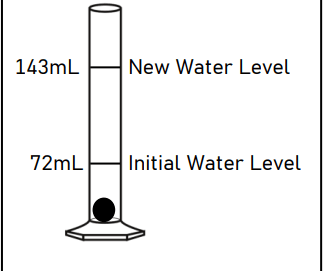The amount of mass per volume unit
Density
The thickness of a fluid
Viscosity
A property of fluids that causes objects to float.
Buoyancy
A decrease in volume due to pressure
Compression
If the mass of an object is 150g and the volume is 25cm3, what is the density?
6g/cm3
The amount of matter in a substance
Mass
The resistance of movement when an object is in contact with another.
Friction
The density of water is 1.0kg/m3. Syrup has a density of 1.37kg/m3. If you pour syrup into water, will it be positively buoyant (float) or negatively buoyant (sink).
Negatively buoyant (sink).
The ability to be compacted by pressure
Compressibility
 If the ball is dropped into the water above, what is the volume of the ball?
If the ball is dropped into the water above, what is the volume of the ball?
71cm3
The amount of space a substance takes up
Volume
Fluids with a high viscosity and high friction have a ___________ to flow.
Resistance
Between water and saltwater, an egg is more likely to float in...
Saltwater
Hydraulic systems use ___________ to transfer force.
Fluids
If 10kg of water is displaced when you place an object into water, what is the buoyant force?
10kg
Fluids that have less particles and more space will be __________ dense.
Less
Which of these liquids have the highest viscosity?
a. Grape Pop
b. Oil
c. Honey
d. Blood
Honey
The _______ of an object will effect how well it can float
Density
When a gas is compressed the temperature...
Increases
If the mass of an object is high, and the volume is low, the density will...
Increase
The formula to calculate density.
Density = Mass / Volume
Volcanoes with magma that is less viscous and liquidy will cause ________ violent eruptions.
Less
The amount of force that needs to be applied for an object to be buoyant in a fluid.
Equal force
The state of matter that has the highest compressibility
Gas.
In a hydraulic system, the master piston has a volume of 5cm3 and the slave piston has a volume of 15cm3. If you apply 3 Newtons of force to the master piston, how much force is applied from the slave piston?
9 Newtons